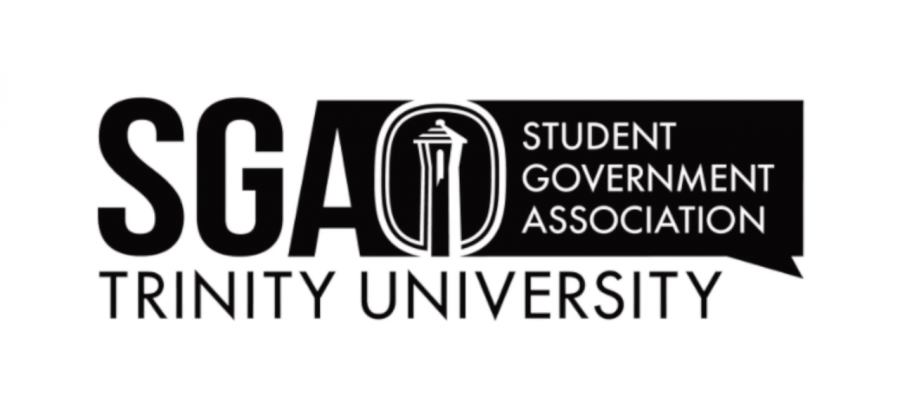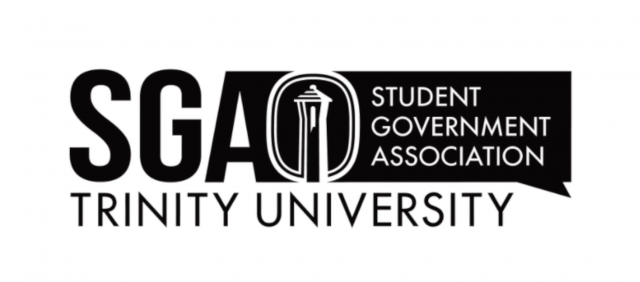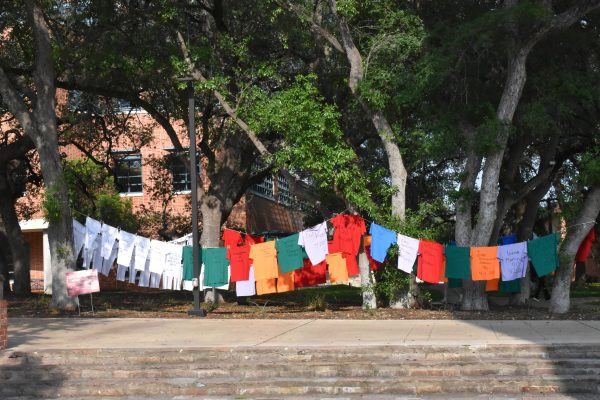Previously on SGA: On-campus dining options and Inclusive Excellence
The following covers the meeting on March 16
Climate Check
First-year Senator Ella Charbonnet began climate check with an inquiry on behalf of Trinity’s club volleyball team, which was interested in getting SGA funding to go to Nationals. President Oliver Chapin-Eiserloh indicated that SGA has funded similar requests in the past and stated that if the amount requested is large it can be subsidized.
Trinity Dining update
Bruce Bravo, Senior Director of Conference and Auxiliary Services, and Charles Robles, Food Service Director, attended the SGA Meeting to present the idea of reinstating a Student Dining Committee.
Robles explained that he hopes putting together a dining committee will open lines of communication between SGA and Trinity Dining. March 29 was proposed as a tentative date for the committee’s first meeting. Robles also proposed the idea of student groups putting on events and takeovers in collaboration with Dining Services.
In addition to a dining committee, Robles proposed a small survey to get a pulse for the student body’s interest in different dining options. Robles explained that the survey would reveal what trends and ideas are popular, allow Dining to see what’s dated and what’s fresh and evaluate programming. Survey results will lead to discussions with the marketing department.
Senior Senator Samuel Grimsley asked what latitude the survey would have and wondered if the student body could choose to swap out restaurants. Grimsley cited the failed campus movement to remove Chick-fil-A from Revolve, despite vocal pushback from the Student Body and a unanimous vote from SGA.
Bravo explained there are limitations as to what dining options can be added to programming. Specifically, Trinity Dining focuses on the “boutique” type of food and favors restaurants that can offer quick service but won’t attract off-campus traffic. Additionally, the franchise must be able to operate in the limited infrastructure of the Coates Student Center and provide a balance of health and wellness.
Robles further explained that in order to enter into independent contracts with chain restaurants, Trinity must be able to meet the company’s franchising standards. He explained that Dining Services had been unable to get a contract with Raising Cane’s because the university could not facilitate the required franchise volume. Robles said although Chick-fil-A received pushback, it was still one of the top earners of the Revolve program, which indicated that people still wanted them on campus.
Bravo added that the decision to keep Chick-fil-A on campus was not made by Dining Services because the institution noted that the issue had become a lightning rod and stepped in to make the decision.
Adviser Demi Brown, Dean of Students, added that because current college students are more brand-conscious and care about quality, there will have to be a lot of due diligence to make sure any new dining option is a fit for Trinity.
Junior Senator Indigo Pearson pointed out that non-Revolve restaurants on campus are large chains—like Einstein Bros, Starbucks and Steak ‘n Shake—which violates the “boutique” standard. Pearson argued that Trinity should be supporting local restaurants like Burger Boy, Boss Bagel and Summer Moon.
Robles explained the introduction of Steak ‘n Shake fulfilled the demand for late-night options. It was also chosen for its connection to Trinity after a former student bought the franchise. He also said that Steak ‘n Shake was an instant success when it was first opened and had been increasing in sales since the return to campus. Robles mentioned Trinity Dining had reached out to Burger Boy and Summer Moon, but the burger joint was still starting up and not ready for a franchise and the local coffee shop won’t do business with the university because they already have a location in a 5-mile radius of the campus.
Robles continued, explaining that what was important to the student base has changed. Five years ago there was demand for heart-healthy, organic, fresh food regardless of cost, which made Freshii an ideal choice for a restaurant to have on campus. Students now are conscious about how they are spending their money and are looking for value and volume. According to Robles, this shift is the reason that the interest survey is important.
However, student interest is not the only consideration in determining programming. Big chains are likely to turn Dining Services down, while local places are not always prepared for all the things that come with a second location — like marketing, providing calorie counts or even writing down recipes. This difficulty is what originally led to the creation of Revolve. The program allows mom-and-pop places an opportunity to earn extra revenue and get the word out without the commitment of a second location, while the rotation between local and national chains prevents students from getting bored.
Robles then turned to the shortages that Dining Services has been facing. Despite increasing average wages after campus reopened to retain staff during the labor shortage, Dining Services still lost staff who either passed away due to COVID or who did not want to return to work and were ready for retirement. Finding new hires has been difficult, leading to the current staff working hard to compensate.
Deliveries have also been short, so Dining Services have had to make frequent trips to Costco and Restaurant Depot to maintain supply. Robles explained that Dining Services had placed a $12,000 order with Core-Mark and only received $2,000 worth of their order. Over spring break they placed a $22,000 order, but only received $8,000 worth of the order. Initially the issue was that vendors did not have stock. Now the issue is that they don’t have people to drive the delivery trucks. As a result, other institutions like St. Mary’s have had to shut down significant parts of their on-campus retail.
Senator Grimsley asked Robles about Tigers Against Aramark and his reaction to community feedback.
Before Robles could respond, Adviser Brown interrupted and said that due to Robles’ position as an Aramark employee, that asking him to comment on Tigers Against Aramark would put him in an uncomfortable position, and to direct questions about that to him.
Robles responded to the second part of the question, explaining that receiving community feedback was hard. He detailed the efforts of his staff to keep Mabee up and running throughout the freeze last spring, including sleeping on the floors of their offices and getting bottled water and bulk water from a warehouse because campus lost water during the freeze. Robles emphasized that dining staff has given up nights and weekends, and that the head chef gets in at 6 a.m. and stays late into the evening. He also compared Trinity Dining to the entire region and to the Aramark division Trinity Dining belongs to, pointing out, for a small school, they do very well.
Robles also went on to point out that he is not responsible for the line of business in corrections. He touched on his personal experience, both as a minority who had to work twice as hard to get to his position and his personal involvement with second-chance programs. Ultimately, Robles stated that he found Tigers Against Aramark hurtful, but he stated that he stood by his work.
Bravo also revealed that the anti-Aramark push led to Robles having a conversation with dining staff, who were not aware of Aramark’s involvement in the prison-industrial complex and were scared they were going to lose their jobs.
Senator Charbonnet asked for an update on the broken ice cream machine in Mabee Dining Hall.
Robles stated that Reyna, the ice cream expert for Dining Services, says one of the pieces in the machine is warped. They need to replace it and are waiting for the right part to come in.
Finally, Robles briefly stated that he strives to keep a balance between those who are vocal and those who aren’t speaking up about issues concerning Dining Services and wants to do his best to provide halal meals on request and to accommodate allergies.
Inclusive Excellence update
Juan Sepulveda, President’s Special Adviser for Inclusive Excellence, attended the SGA meeting to discuss Trinity’s new Inclusive Excellence Advisory Council and Action Summit. Sepulveda was also interested in hearing senators’ opinions about issues that should be brought to the table.
Senator Grimsley asked how the Advisory Council and its different task forces will keep the student body up-to-date as to what they’re doing. Sepulveda explained that they would be launching a website on March 17 so the student body can see all the ideas and issues that the council has on the table.
Senator Pearson asked about whether they had considered taping meetings or putting up meeting highlights and minutes on the website. Sepulveda explained that taping would not be feasible due to the meeting’s less traditional approach and location (Holt Center Lawn); however, he will look into putting together meeting notes to make public.
First-year Senator Harrison Tinker asked about the Advisory Council’s upcoming Friday meeting (March 18). According to Sepulveda, the meetings will follow the open concept model. This model trusts the people in the room to set the agenda and talk about the issues that they want to address. Anybody can pitch ideas. Sepulveda also said that the roughly 70 members of the council won’t be enough to put all their ideas into action, so they will be reaching out to the Trinity community.
President Chapin-Eiserloh asked about the hiring process for the Associative Director of Inclusive Excellence. Sepulveda explained there were many key questions that needed to be answered throughout the process. For example: does the chief diversity officer have a team? Do people report directly or shared reporting? According to Sepulveda, the DIE is going to have three new secondary officer positions for next school year, and admissions wants an inclusive excellence officer in their department.
Senator Grimsley asked how they plan on implementing initiatives in the current cultural, social and media environment. Sepulveda said while it is important to be aware of the current environment and culture, they want to avoid becoming reactive and only responding to hot-button issues. Sepulveda explained that the council hoped to be proactive about tackling issues to avoid becoming reactive.
Sepulveda asked SGA what issues they think the council should address and what they think should be at the top of the list.
Senior Senator Gavin Barrera put forward language inclusion. Barrera pitched an institutionalized change to normalize language inclusion and so that students aren’t burdened with translating for their parents and families.
President Chapin-Eiserloh brought up the recruitment and retention of more diverse faculty. He pointed out that the student body cycles through every four years but the faculty are the ones who stay and play an important role in reaching more diverse classes.
Sepulveda responded by bringing up Vice President for Academic Affairs Megan Mustain, who promotes cluster hires as a tool to think about diversifying hires.
Adviser Brown explained that the principle of a cluster hire is instead of just hiring someone who can teach one subject, the university hires someone who can teach that subject as well as related subjects. For example, hiring a biologist who can also teach physics, or a political scientist who can also teach history.
Adviser Brown asked Sepulveda why it is important to recognize students for their time.
Sepulveda said he was surprised universities don’t use students committees more because they are the ones on the ground level of the institution. He said students’ time should be respected, which meant students’ time should be compensated. According to Sepulveda, institutions have been taking advantage of students for a while, and he wants to create a culture where compensation for time is a given. Sepulveda mentioned they ask members of the council for a two-year commitment, meaning most students currently involved are first-years and sophomores.
Senator Pearson said that he thinks SGA should be paid. He argued that paid positions incentivize students to get involved, and cites his own experience as first-year working two jobs versus being a junior and having more flexibility to be involved on campus.
Sepulveda responded by talking about an experiment in development which would put aside a small amount of money to free up students who maybe need to work to help give them time to get involved on campus. The tricky part is finding the balance in relieving financial stress for students while also not being a tax burden.
Sepulveda closed out his time by explaining that his other hope for the Inclusive Excellence website is to help students get involved and connect kids to nation-wide opportunities. He advised signing up even if you can’t join, because then you’re in the database and you can get connected to national pieces. Sepulveda stated that connecting students to opportunities is part of becoming one of the top liberal arts colleges in the country.
Officer Reports
President Chapin-Eiserloh opened officer announcements with a reminder that there are two empty Senate seats—one in the class of 2023 and one in the class of 2022.
President Chapin-Eiserloh also announced that SGA elections for the next school year begin March 21. The Vice President and President positions will be open for rising juniors and seniors, and those two positions are being moved toward paid positions. The only positions open to rising sophomores are senator seats. After a week of campaigning, voting will occur April 4-6. Election results will be announced April 8. Any senators not running for reelection can serve on the election committee.
Treasurer Adam Rinaldi gave an update on the finance committee, which approved two requests for funding and declined one request.
Legislative Relations Chair Penelope Slentz closed out the meeting with a reminder about Free Food Friday, stating that they will be passing out food from Bird Bakery and Laika at upcoming events.

My name is Alejandra, and I'm a senior majoring in Neuroscience. I initially joined the Trinitonian as a first-year and worked my way up from a Sports...











